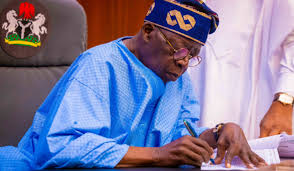Tinubu’s fresh $21.5bn loans may not increase Nigeria’s debt profile, FG clarifies

The federal government of Nigeria has clarified that the fresh $21.5 billion loans proposed by the government won’t stoke the country’s debt burden as it plans to source them from its development partners.
The ministry of finance through a statement issued on Tuesday by Mohammed Manga, the director, Information and Public Relations, emphasised that the borrowing plan does not equate to actual borrowing for the period.
This is against the backdrop of media reports making rounds that the fresh loans may push the country’s debt to N183 trillion, fanning fears of fiscal sustainability amid rising debt servicing.
“It should be noted that the Borrowing Rolling Plan does not equate to an automatic increase in the nation’s debt burden. The nature of the rolling plan means that borrowings are split over the period of the projects,” Manga said in a statement.
Nigerian President Bola Tinubu on Tuesday asked parliament to approve more than $21.5 billion in foreign borrowing for its 2025-26 borrowing plan to plug financial shortfalls to boost growth.
Tinubu also asked parliament to approve 2.2 billion euros ($2.5 billion) and 15 billion yen ($103.97 million) of borrowing abroad in addition to $2 billion dollar-denominated borrowing at home.
The new borrowing makes up around 60 percent of the total spending earmarked in the 2025 budget and marks a shift in the government plan to promote investment abroad to attract equity investors rather than debt to curtail rising debt costs.
Manga, however explained that actual borrowing for each year, which accrues into the nation’s debt profile, is contained in the annual budget.
The proposed borrowing, planned for the second half of this year, will be beneficial for both federal and several state governments across numerous geopolitical zones including Abia, Bauchi, Borno, Gombe, Kaduna, Lagos, Niger, Oyo, Sokoto, and Yobe States.
“These projects cut across critical sectors of the economy, including power grids and transmission lines, irrigation for improving food security, fibre optics network across the country, fighter jets for security, and rail and road infrastructure,” Manga said.
According to the statement, the majority of the proposed borrowing will be sourced from Nigeria’s development partners, including the World Bank, African Development Bank, French Development Agency, European Investment Bank, JICA, China EximBank, and the Islamic Development Bank.
It added that these institutions offer concessional financing with favourable terms and long repayment periods, thereby supporting Nigeria’s development objectives sustainably.
Tinubu is seeking to ramp up infrastructural development in order to boost growth and lure in investments in the country after he canceled costly fuel subsidies and devalued the nation’s currency in a boldest wave of reforms that have triggered the worst cost-of-living crisis in decades.
While the country appears to be moving into a market-driven economy and annual GDP growing at its fastest pace in more than a decade, the renewed focus on infrastructure is poised to further accelerate Nigeria’s growth.
Meanwhile, Seun Onigbinde, co-founder BudgIT, has raised questions as to why the government keeps borrowing when revenues are ballooning, calling for caution amid escalating external debt.
“We are in an era of sky-high FG revenues, which is meant to cut deficits, if properly applied, ” Onigbinde said in a post on X Wednesday.
“Unfortunately, we have failed to apply fiscal discipline to the budget, still putting us on the back of borrowing funds. So what are we borrowing for? To fund the budget gap for tricycles and solar street lights?”




